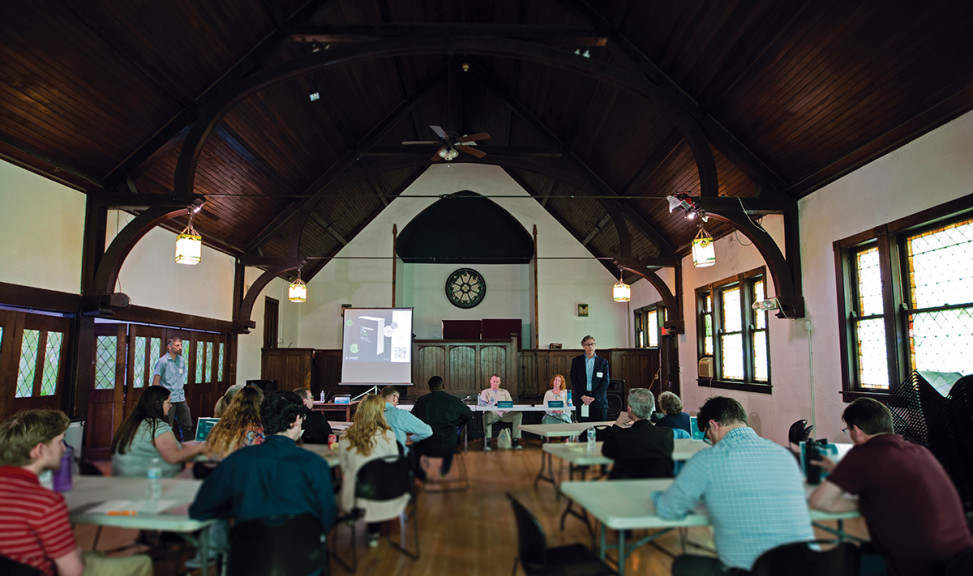‘Genomics and Faith’ connects scientists and people of faith in C-U

Community members gather for the first Genomics for Faith workshop in 2023. Courtesy of Claudia Lutz
There’s a common misconception about science and faith: that the two cannot coexist. But one group in Champaign-Urbana is working to change that.
Genomics for Faith aims to connect scientists and people of faith in the community. The program was created by the outreach team at the Carl R. Woese Institute for Genomic Biology at the University of Illinois at Urbana-Champaign.
“The idea of working in some way with faith groups came up because there is such a long history of conflict between religion and science,” said Claudia Lutz, the outreach manager for the IGB. “But in many areas of life, some of the root goals of both of those endeavors are the same: to just understand the world better, to try to help other people, to try to improve the way our society works.”
Genomics for Faith began in May 2023 and is part of a long-standing series of workshops called “Genomics For…” These workshops aim to connect different groups and provide them with content that highlights the connections between genomics and their endeavors.
Previous Genomics for Faith workshops focused on topics such as gene editing technologies and ideas of life and death.
The group’s most recent workshop, on Feb. 15, focused on stem cell research. Attendees learned about the different kinds of stem cells that exist and how scientists obtain them.
Participants had the opportunity to visit a lab and meet researchers studying how to use stem cells to treat diabetes.
“I walked in, and it's not what I was expecting at all. They were working with mouse stem cells,” said Susan Barreto, a faith leader participant and member on the steering committee for the Lutheran Alliance for Faith, Science and Technology. “You kind of have a thought in your mind that it's going to look sort of special or unique. And it was a circle with lots of little circles, and I hadn’t looked in a microscope in, oh gosh, 30 years.”
Barreto said being able to see the research first hand and speak with scientists helps people better understand scientific processes and procedures, which allows them to delve deeper into the ethics of the various practices.
The workshops include a presentation, small group discussions and a question-and-answer session. Small group discussions were added as a result of feedback from attendees, Lutz said. After the first workshop, which featured a whole-room question-and-answer panel, participants indicated they wanted an opportunity for smaller, more intimate conversation.
“It was very interesting to have scientists come and answer questions as best they could, and to talk about not only their research, but the research that's in the world right now about those things. The religious people who came could ask questions about that,” said Amy Felty, a local leading member of the Bahá'í Faith. “There was no contention involved. It was all a matter of sharing what's known and what people are doing.”
Felty said that faith and science go hand in hand as two sides of the same coin — that coin being reality. Bareto cited similar beliefs, saying that better appreciation of science has strengthened her faith.
As an organizer, Lutz said she appreciates the participants and their willingness to attend, even if discussions involve some emotionally loaded topics.
“I think that when we talk about safe spaces, sometimes we think about being protected from anyone who might challenge our worldview,” Lutz said. “It's been an opportunity for people to explore having different worldviews that they're articulating with each other, but without experiencing a critique or a disagreement that turns into a personal attack.”
The next Genomics for Faith workshop is tentatively planned for April or May. Lutz recommends people who are interested keep an eye on the IGB website or email her at cclutz2@illinois.edu for more information.

